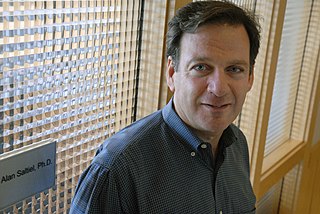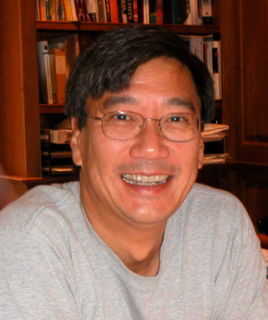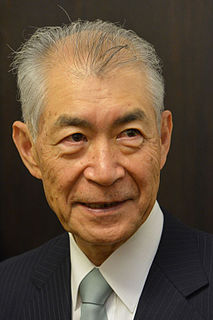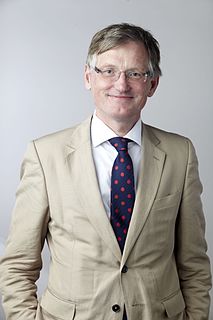The University of Texas Southwestern Medical Center is a medical education and biomedical research institution in Dallas, Texas, US. With approximately 14,400 employees and an operating budget of nearly $2.5 billion, UT Southwestern is one of six medical schools in the UT System. It is one of the largest medical schools in the country, annually training about 3,700 medical, graduate, and health professions students, residents, and postdoctoral fellows. Ongoing support from outside sources provides approximately $422.6 million per year for more than 5,700 research projects.

Paul Berg is an American biochemist and professor emeritus at Stanford University. He was the recipient of the Nobel Prize in Chemistry in 1980, along with Walter Gilbert and Frederick Sanger. The award recognized their contributions to basic research involving nucleic acids. Berg received his undergraduate education at Penn State University, where he majored in biochemistry. He received his Ph.D. in biochemistry from Case Western Reserve University in 1952. Berg worked as a professor at Washington University School of Medicine and Stanford University School of Medicine, in addition to serving as the director of the Beckman Center for Molecular and Genetic Medicine. In addition to the Nobel Prize, Berg was presented with the National Medal of Science in 1983 and the National Library of Medicine Medal in 1986. Berg is a member of the Board of Sponsors for the Bulletin of the Atomic Scientists.

Werner Arber is a Swiss microbiologist and geneticist. Along with American researchers Hamilton Smith and Daniel Nathans, Werner Arber shared the 1978 Nobel Prize in Physiology or Medicine for the discovery of restriction endonucleases. Their work would lead to the development of recombinant DNA technology.

Oliver Smithies was a British-American geneticist and physical biochemist. He is known for introducing starch as a medium for gel electrophoresis in 1955, and for the discovery, simultaneously with Mario Capecchi and Martin Evans, of the technique of homologous recombination of transgenic DNA with genomic DNA, a much more reliable method of altering animal genomes than previously used, and the technique behind gene targeting and knockout mice. He received the Nobel Prize in Physiology or Medicine in 2007 for his genetics work.

Mary-Claire King is the American Cancer Society Professor of Genome Sciences and of Medical Genetics in the Department of Medicine at the University of Washington. She studies human genetics and is particularly interested in genetic heterogeneity and complex traits. She studies the interaction of genetics and environmental influences and their effects on human conditions such as breast and ovarian cancer, inherited deafness, schizophrenia, HIV, systemic lupus erythematosus and rheumatoid arthritis.

Alan R. Saltiel was the Mary Sue Coleman Director of the Life Sciences Institute at the University of Michigan; a professor at the Division of Molecular Medicine and Genetics at the University of Michigan Medical School; a faculty member at the Michigan Diabetes Research and Training Center; and John Jacob Abel Professor of Life Sciences, Department of Molecular and Integrative Physiology; a member of the Steering Committee Member at the Center for Advancing Research & Solutions for Society. He served as the Director of the Life Sciences Institute from 2001 to 2015. He was also a John Jacob Abel Collegiate Professor of the Life Sciences at the Department of Molecular & Integrative Physiology at the UM Medical School. He holds an AB from Duke University (1975) and a Ph.D. from the University of North Carolina (1980).

Peter S. Kim is an American scientist. He was president of Merck Research Laboratories (MRL), 2003-2013 and is currently Virginia & D.K. Ludwig Professor of Biochemistry at Stanford University, Institute Scholar at Stanford ChEM-H, and Lead Investigator of the Infectious Disease Initiative at the Chan Zuckerberg Biohub.
Sir John Irving Bell is a Canadian immunologist and geneticist. From 2006 to 2011, he was President of the Academy of Medical Sciences, and since 2002 has held the Regius Chair of Medicine at the University of Oxford, UK. He has been Chairman of OSCHR since 2006.
Hugh O'Neill McDevitt ForMemRS is a Professor of Microbiology and Immunology at Stanford University School of Medicine.

Professor Sir Stephen Patrick O'Rahilly is an Irish-British physician and scientist known for his research into the molecular pathogenesis of human obesity, insulin resistance and related metabolic and endocrine disorders.

Tasuku Honjo is a Japanese immunologist, and Nobel laureate best known for his identification of programmed cell death protein 1 (PD-1). He is also known for his molecular identification of cytokines: IL-4 and IL-5, as well as the discovery of activation-induced cytidine deaminase (AID) that is essential for class switch recombination and somatic hypermutation.

Patrik Rorsman FRS FMedSci is Professor of Diabetic Medicine at the Oxford Centre for Diabetes, Endocrinology and Metabolism (OCDEM), in the Radcliffe Department of Medicine at the University of Oxford and a fellow of Harris Manchester College, Oxford.
Eleftheria Zeggini is the Director of the Institute of Translational Genomics in Helmhotz Zentrum Munchen in Neuherberg, Germany. Until her departure in 2018 she was a research group leader at the Wellcome Trust Sanger Institute and an Honorary Professor in the Department of Health Sciences at the University of Leicester in the UK.
Alex Marson is an American biologist, specializing in genetics, human immunology, and CRISPR genome engineering. He is a tenured Associate Professor in the Department of Microbiology and Immunology at the University of California, San Francisco (UCSF), where he leads research at the Marson Lab.
John C. Crabbe, Jr. is an American neuroscientist and behavior geneticist. He is a professor of behavioral neuroscience at the Oregon Health & Science University (OHSU) School of Medicine, where he has worked since 1979. He is also a senior research career scientist at the Veterans Affairs Medical Center in Portland, Oregon. He is also the former director of OHSU's Portland Alcohol Research Center.
Omid Farokhzad is an Iranian- American physician, scientist, and entrepreneur in the development of nanomedicines. Farokhzad is a Professor of Anesthesiology at Harvard Medical School. Farokhzad and his team of scientists have developed numerous nanotechnologies for medical applications. He has authored more than 150 papers and is an inventor of more than 150 issued / pending patents worldwide. He was selected by Thomson Reuters among the Highly Cited Researchers in 2014, 2015, 2016, and 2017. The Boston Globe selected him among the top innovators in Massachusetts and the Boston Business Journal selected him among the Health Care Champions for his innovations.
Georgia Mae Dunston is a professor of human immunogenetics at Howard University and founding director of the National Human Genome Center at Howard University.
Michael C. O'Donovan is a Scottish psychiatric geneticist who researches the genetics of schizophrenia. He is a clinical professor in the Division of Psychological Medicine and Clinical Neurosciences and the deputy director of the MRC Centre for Neuropsychiatric Genetics and Genomics at the Cardiff University School of Medicine in Cardiff, Wales. He also leads the Schizophrenia Group of the Psychiatric Genomics Consortium. Educated at Glasgow University, he also serves as Academic Psychiatry Lead for the Royal College of Psychiatrists in Wales. He was lead author of a 2014 study in Nature which identified over 100 genetic loci associated with an increased risk of schizophrenia. The study, the largest of its kind undertaken at the time, was covered extensively in the media. It was also praised by Thomas Insel, the then-director of the National Institute of Mental Health, who described the study as "a big step forward".
Jim Mann is Professor in Human Nutrition and Medicine at the University of Otago and Consultant Physician (Endocrinology) in Dunedin Hospital, New Zealand.
Ana Pombo is an appointed Professor (W3) of Biology at Humboldt University and senior group leader at the Berlin Institute for Medical Systems Biology (BIMSB) at the Max Delbrück Center for Molecular Medicine (MDC) in Berlin-Buch with the focus on "Epigenetic Regulation and Chromatin Architecture". Since May 2018, Pombo is an elected member of the European Molecular Biology Organization (EMBO).









